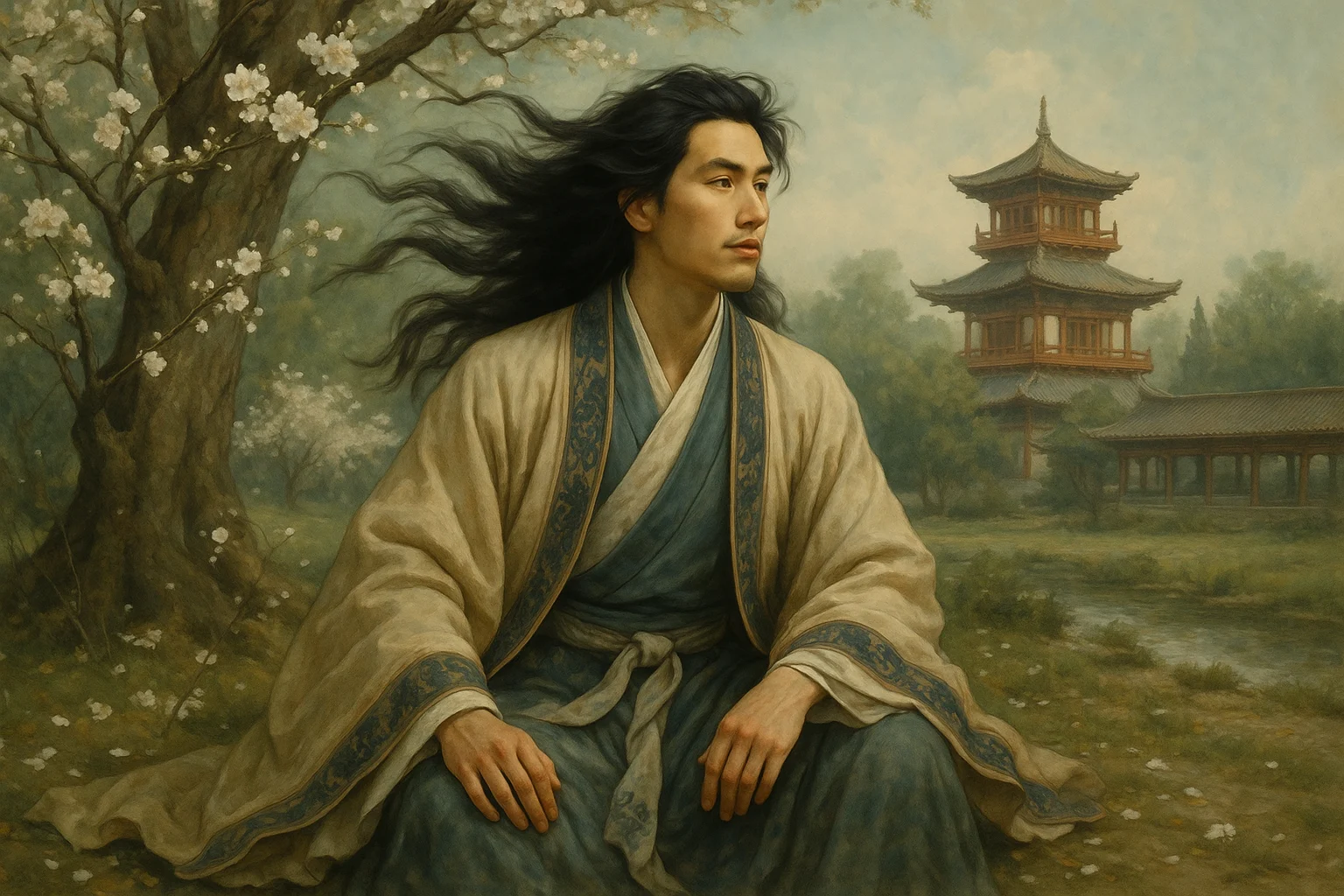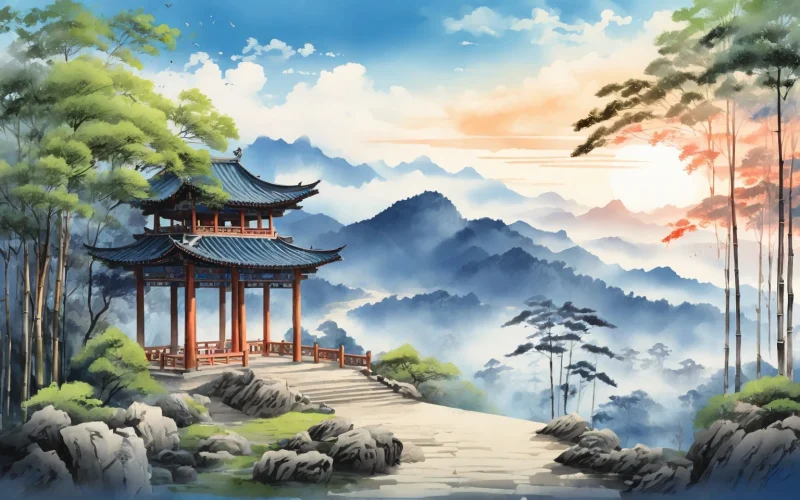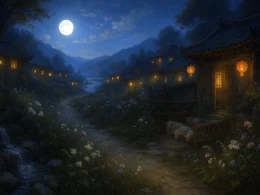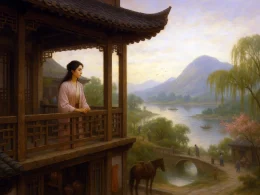Though the East Pavilion stands grand in state,
Here, we seek the Bamboo Grove’s quiet date.
Through ten thousand leaves—autumn’s whispery choir,
A thousand homes bask in sunset’s fire.
The gate grows still as the deep lane’s embrace,
Through the window—distant bells with unhurried grace.
Where moss creeps soft o’er the guesthouse floor,
Lingering, I brush this verse once more.
Original Poem
「题苏许公林亭」
韩翃
平津东阁在,别是竹林期。
万叶秋声里,千家落照时。
门随深巷静,窗过远钟迟。
客舍苔生处,依依又赋诗。
Interpretation
This poem was composed during the poet's visit to the forest pavilion of Duke Xu of Suzhou, depicting the serene autumn scenery of the pavilion and expressing profound contemplative emotions. Through delicate landscape descriptions, the poet conveys his love for natural environments and yearning for reclusive living.
First Couplet: "平津东阁在,别是竹林期。"
Píng jīn dōng gé zài, bié shì zhú lín qī.
The eastern tower of Pingjin still stands,
A place once pledged for bamboo grove gatherings.
The opening line, with "the eastern tower still stands," highlights the enduring beauty of the site, evoking nostalgia. "Bamboo grove gatherings" carries the memory of scholarly camaraderie, transforming this location not just into a physical space but a spiritual one, resonating with past refined gatherings. Through this imagined rendezvous in the bamboo grove, the poet expresses his longing for an elegant lifestyle and his cherished ideals of noble friendships.
Second Couplet: "万叶秋声里,千家落照时。"
Wàn yè qiū shēng lǐ, qiān jiā luò zhào shí.
Amid the rustling chorus of autumn leaves,
A thousand homes bask in the setting sun's glow.
This couplet captures the depth of autumn around the pavilion. "Rustling chorus of autumn leaves" enriches the imagery with both visual ("myriad leaves") and auditory ("autumn whispers") layers, depicting the dynamic scene of nature’s decline in late autumn. "A thousand homes in sunset’s glow" expands the view from the forest to distant dwellings, their warmth under the slanting light subtly hinting at life’s twilight and contemplative thoughts of reclusion.
Third Couplet: "门随深巷静,窗过远钟迟。"
Mén suí shēn xiàng jìng, chuāng guò yuǎn zhōng chí.
The gate grows still by the deep lane’s hush,
Through the window drifts a distant bell’s slow toll.
The scenery deepens further in tranquility. The secluded lane lends an almost otherworldly quietude, while "a distant bell’s slow toll" adds an auditory texture—the word "slow" (迟) is masterfully chosen, not only painting the bell’s sound as if traversing time and space but also enhancing the ethereal serenity of the pavilion at dusk. It evokes philosophical musings on the passage of time and the illusory nature of worldly affairs.
Fourth Couplet: "客舍苔生处,依依又赋诗。"
Kè shè tái shēng chù, yī yī yòu fù shī.
Where moss creeps over the guesthouse walls,
Lingering with emotion, I take up my brush once more.
The closing couplet turns from scenery to sentiment, channeling external observations into inner reflection. Moss growing on the guesthouse suggests long abandonment—perhaps the poet himself has lingered in this secluded spot. "Lingering" (依依) brims with tender reluctance, conveying both attachment to the surroundings and intoxication with the peaceful passage of time. "Take up my brush once more" reveals the poet’s irrepressible urge to express his feelings, seamlessly merging scene and emotion, ink and thought, leaving an endless aftertaste.
Holistic Appreciation
Set against the autumn scenery of a forest pavilion, the poem artfully blends nature and humanistic reflection. It features delicate depictions of seasonal beauty while evoking a contemplative mood in serene surroundings. Through details like doors, windows, temple bells, and moss, the poet creates an atmosphere of tranquil seclusion, expressing his fondness for reclusive mountain life and revealing quiet musings during solitude. The language is simple yet natural, with harmonious rhythm and vivid imagery that uplifts the spirit.
Artistic Merits
Han Hong's poem employs refined yet understated language, emphasizing detailed scenery and atmospheric depth. The verses are tightly structured, with a brisk yet gentle cadence—elegant yet fresh. By engaging multiple senses (sound, light, color, texture), it captures the unique charm of a late-autumn forest pavilion, showcasing the poet's keen observation and artistic expressiveness.
Insights
This poem reminds us to pause amid life's haste, appreciate nature's beauty, and cherish moments of stillness to nurture inner peace and poetic sensibility. It also inspires us to transform ordinary scenes into resonant art through attentive observation and feeling.
About the Poet

Han Hong(韩翃), a native of Nanyang, Henan, was one of the "Ten Literary Masters of the Dali era" (大历十才子). He was renowned for his poetry, particularly farewell and parting verses, which gained significant acclaim during his time. The Complete Tang Poems (《全唐诗》) preserves three volumes of his works.












